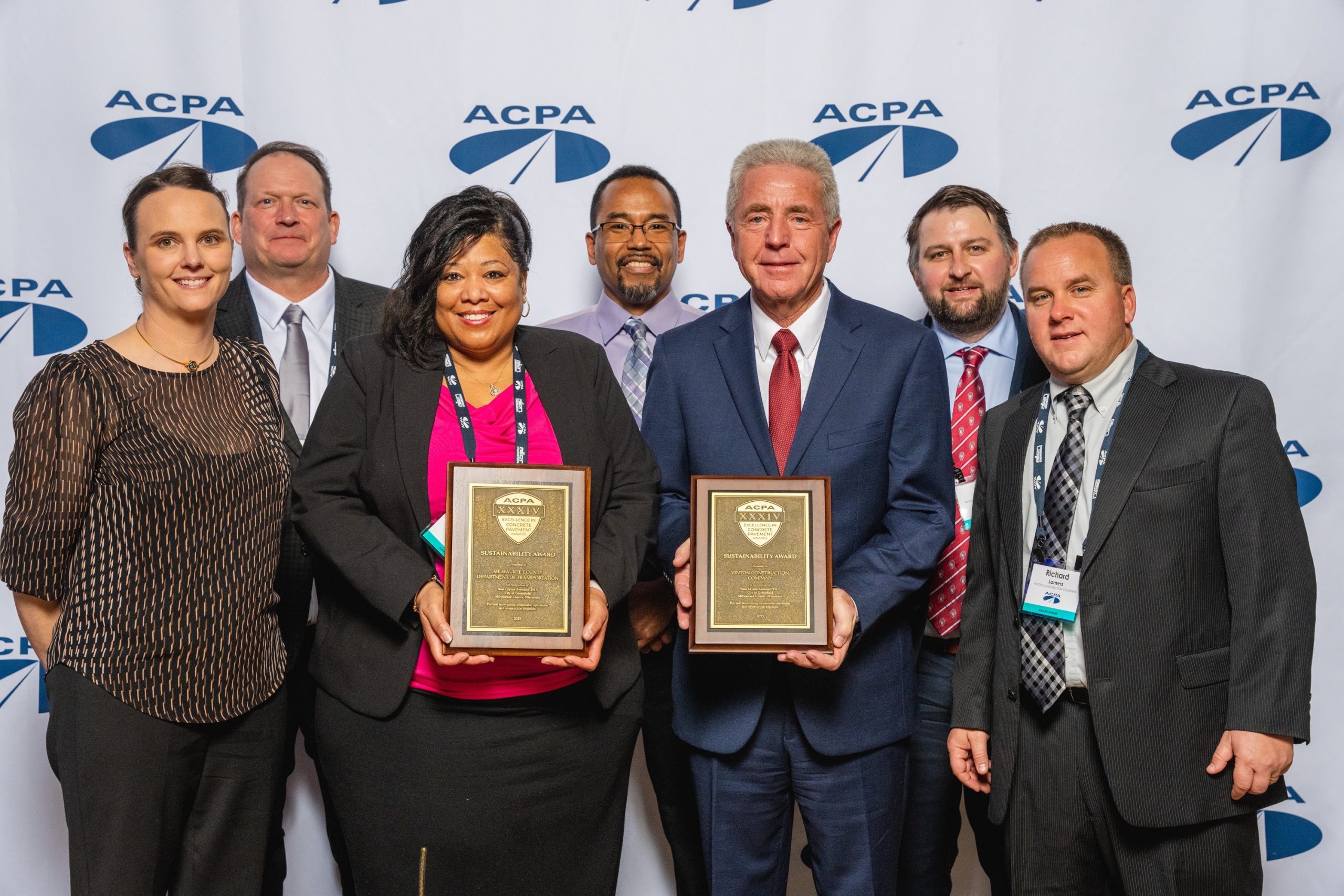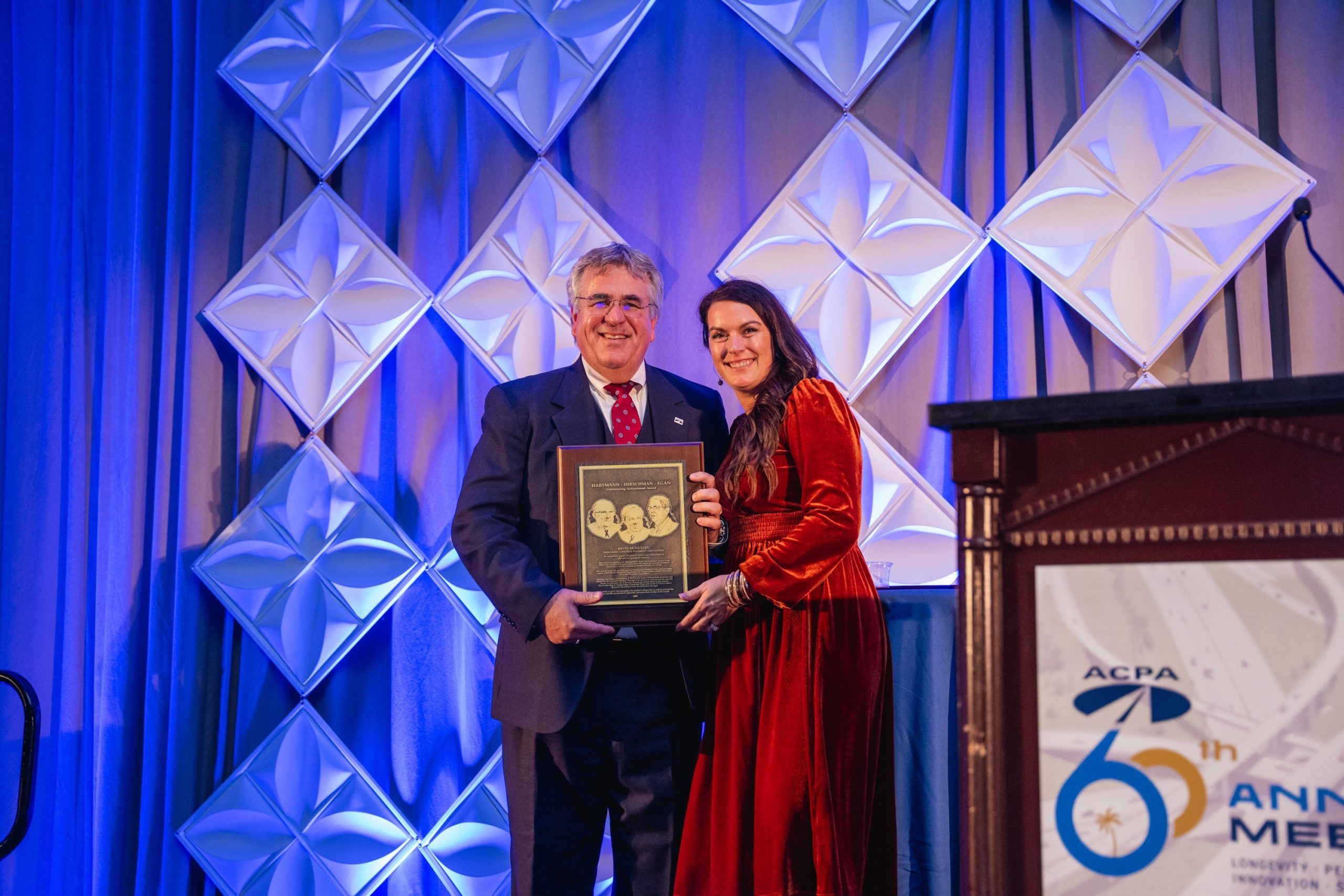
The American Concrete Pavement Association has named recipients of its annual awards for individuals, organizations and agencies in transportation engineering, construction, education and funding program advocacy, plus those excelling in concrete pavement promotion.
Sustainable Practices Recognition Award. Presented annually to an organization demonstrating leadership by implementing sustainable design and construction practices that consider societal, environmental, and economic factors. This year’s recipient is the Federal Highway Administration. Over the last few years, the agency has introduced meaningful programs that will change the course of paving to become more sustainable industry-wide. First, FHWA introduced Climate Challenge, which provided funding to states for projects that were using sustainable practices including Environmental Product Declaration and Life Cycle Assessment submittals. Next, through the Every Day Counts program, FHWA is providing information, training, and funding on how to use EPDs for project delivery. Finally, the agency is overseeing Inflation Reduction Act grants and programing to help the industry create lower carbon-impact materials. FHWA is likewise continuing to take the input from its Sustainable Pavements Technical Working Group toward actionable programs.
Resilient Practices Recognition Award. Presented to an organization demonstrating leadership by implementing resilient design and construction practices that consider societal, environmental, and economic factors. This year’s recipient is the Federal Aviation Administration Southern Region. Collaborating with the ACPA national office and Southeast Chapter, the agency has worked with airfield pavement designers and airport sponsors to develop alternative pavement rehabilitation choices, including concrete overlays, for several general aviation facilities. FAA Southern Region specifications have captured the attention of designers and airport sponsors in other FAA Regions—spreading the reach of concrete overlays as a viable, resilient airport pavement rehabilitation strategy around the country.

Best in Show Sustainability Award. Presented to the organization and project that best showcase sustainable operations and construction practices. This year’s award goes to the Milwaukee County Department of Transportation in recognition of West Layton Avenue, County Highway Y, in Greenfield, Wis. The department teamed up with Vinton Construction Co., whose sustainable practices brought the project recycled materials, on-site concrete recycling, utilization of fly ash, performance engineered mixtures, paperless technology (e-ticketing), and hybrid weekly meetings. Such actions are recognized for their potential to reduce waste, conserve resources, lower carbon emissions, and contribute to the overall environmental sustainability of the construction process.

Hartmann-Hirschman-Egan Award. Recognizes individuals or organizations for unparalleled commitment, dedication, participation, and leadership in the concrete pavement community. This year’s winner is Wisconsin Concrete Pavement Association CEO Kevin McMullen, who joined the group in 1995 and served as president from 1998-2023. Prior to WCPA, he worked as pavement engineering supervisor for the Wisconsin Department of Transportation. He has represented the industry on National Cooperative Highway Research Program research panels and has served on several Transportation Research Board committees.
Harold Halm Presidential Award. Presented at the ACPA president’s discretion to an individual who has made significant contributions to the concrete pavement industry. This year’s recipient is Congressman Frank Lucas, who represents Oklahoma’s Third Congressional District and chairs the House Science and Technology Committee. ACPA officials cite especially his unwavering support of pavement research funding, which helps support the National Concrete Pavement Research Technology Center (CP Tech).
Marlin J. Knutson Award for Technical Achievement. Recognizes individuals who have made significant contributions to advancing the development and implementation of technical innovations for pavement design and construction. This year’s recipient is Dr. Peter Taylor of the CP Tech Center, whose pioneering work in concrete mix designs has led to the development of high-performance pavements that exhibit exceptional strength, durability, and resistance to environmental factors. Dr. Taylor has been at the forefront of research efforts to develop eco-friendly concrete materials and construction methods. By incorporating recycled aggregates and supplementary cementitious materials in mix designs, he has significantly reduced the environmental impact of concrete pavements, aligning the industry with global sustainability goals.
Outstanding Promoter Award. Presented to an individual who has advanced the awareness, specification and/or placement of concrete pavements. This year’s recipient is Concrete Paving Association of Minnesota Executive Director Matt Zeller, who has advocated for testing and research on MnROAD sections leading to advancements in how to approach early traffic loading on concrete pavement.
National Lifetime Pavement Recognition Award. Presented to an agency/owner of an in-service concrete pavement that has demonstrated exceptional performance for its state and community, and for local users. This year the award recognized Old State Highway 20 in Woodbury County, Iowa. After more than 100 years of service, the road has shown remarkable longevity, durability, and resilience. It holds immense historical significance as one of the oldest highways in the region and represents a crucial milestone in the evolution of transportation infrastructure.
Best in Show Innovation Award. Presented to the organization and project that best showcase innovation in either the contracting process or during the construction phase to improve safety, cost to construct, value, quality, and performance. This year’s recipient is the Iowa Department of Transportation, in recognition of IA Highway 3 accelerated overlay in Plymouth County, delivered with the help of Croell Inc. To facilitate the project, several traffic management innovations were used, among them a) Mobile LiDAR for surveying the existing roadway profile, thus eliminating any surveyors working in the roadway during project setup; and, b) profile milling the existing roadway under single lane closure with pilot cars, thus reducing the amount of detoured traffic.